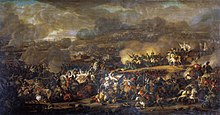huge and heavy battle during the War of the Sixth Coalition against Napoleon (1813) From Wikipedia, the free encyclopedia
The Battle of Leipzig, or Battle of the Nations, was a battle of Napoleon I and his army against an allied force of several nations on October 16 to 19, 1813. Napoleon’s army had been defeated and depleted in the French invasion of Russia. The French were also losing the Peninsular War and retreating everywhere.
| Battle of Leipzig | |||||||
|---|---|---|---|---|---|---|---|
| Part of the War of the Sixth Coalition | |||||||
 The Battle of Leipzig by Vladimir Moshkov (1815) | |||||||
| |||||||
| Belligerents | |||||||
|
| ||||||
| Commanders and leaders | |||||||
|
Józef Antoni Poniatowski † |
| ||||||
| Strength | |||||||
|
195,000[2] 700 guns [3] |
430,000[2] 1,500 guns [3] | ||||||
| Casualties and losses | |||||||
|
38,000 dead or wounded 20,000 captured | 54,000 dead or wounded[2] | ||||||
Being outnumbered, he attacked. His allies in the Confederation of the Rhine changed sides, and Napoleon was defeated. The batle was the one of the largest battles before World War I and involved about 600,000 soldiers and the largest cavalry charge ever. It was part of the War of the Sixth Coalition.
After the battle and the later defence of Paris (1814), Napoleon was taken to the Mediterranean island of Elba.
Seamless Wikipedia browsing. On steroids.
Every time you click a link to Wikipedia, Wiktionary or Wikiquote in your browser's search results, it will show the modern Wikiwand interface.
Wikiwand extension is a five stars, simple, with minimum permission required to keep your browsing private, safe and transparent.